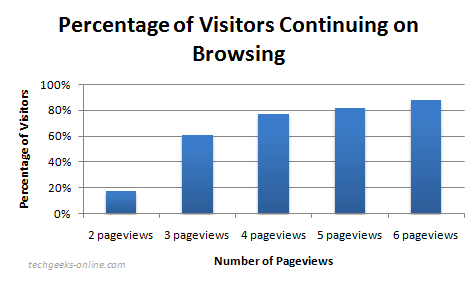Increasing Website Conversions With Supplementary Content
It makes sense that linking to supplementary content for articles on your website will greatly reduce bounce rates. People visit a website to find information, and linking them to more information will get them interested. I wondered if, by using supplementary content pages to reduce bounce rates, visitors would be more likely to stay on a site after their second page. Is the second page psychologically the hardest to navigate to?
This was the scenario I wanted to test: If a person visits (that would otherwise bounce) visits a site and sees a link to a related article, if they click through to that related article, does that increase the likelihood that they continue browsing the site? In other terms, once a visitor has begun to browse around a site, are they more likely to continue browsing?
I looked at my visitor analytics (at w3techie) for an answer. I took a short time period of visitors to our forum to look at. During this time period, 82.83% of visitors only had one pageview. 6.68% had two pageviews and 2.41% had three pageviews. I exported this data into Excel and found cumulative values; I found how many visitors had one pageview or more, two pageviews or more, etc. I found that the longer people had browsed on the site, the more they continued onto another pageview. I graphed my findings:

As visitors continue browsing, their exit rates decrease.
Only 17% of visitors in my sample group made it to two pages. Of the people who visited two pages, 61% made it to a third. Of the people who made it to a third, 77% made it to a fourth, etc. This supports my theory that the second page is the most difficult to navigate to, and that as a visitor browses longer the easier it is for them to continue browsing.
Now that I have established that the second page is the most difficult, I wondered if overall conversions could be increased by pushing a second page to be voluntarily accessed. This is where supplementary content comes into play. A visitor comes to a site looking for information – we will give him that information; but, we will also link him to a very closely related article which will enhance the information the visitor got. If the visitor clicks through to the second page, they are hooked and our goal has been accomplished.
How does this affect conversions? I believe that the more comfortable a visitor is browsing around a site, the easier it will be for them to reach your goal, whether it’s a sale, a registration, a subscription, a donation, etc.
What are the applications of this? If everything I said in this article is true, then website conversions can be increased with supplementary content (just like the title says). If a webmaster creates closely-related pages to supplement eachother, and if the webmaster interlinks these pages, then the bounce rates for the website could drop and conversions could increase.


Sounds like a good theory. For it to work you would have to plan accordingly. When I write a post I will usually link to other posts that are related in some way in the hope that they would stick around a bit longer. If your theory was correct though it would be better to have posts linked that were directly related rather than having just something in common.
That being the case perhaps it would be better to have two posts written specifically and going live at the same time so that readers get the ultimate benefit?